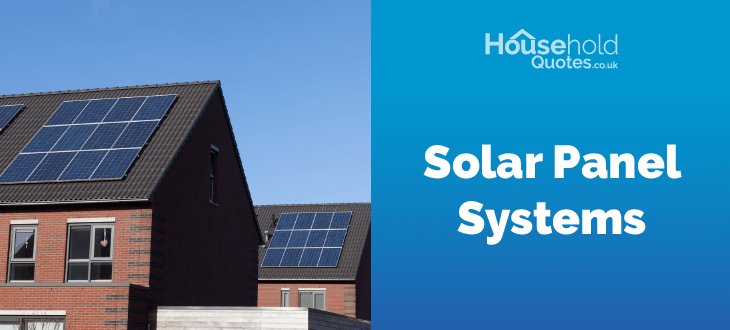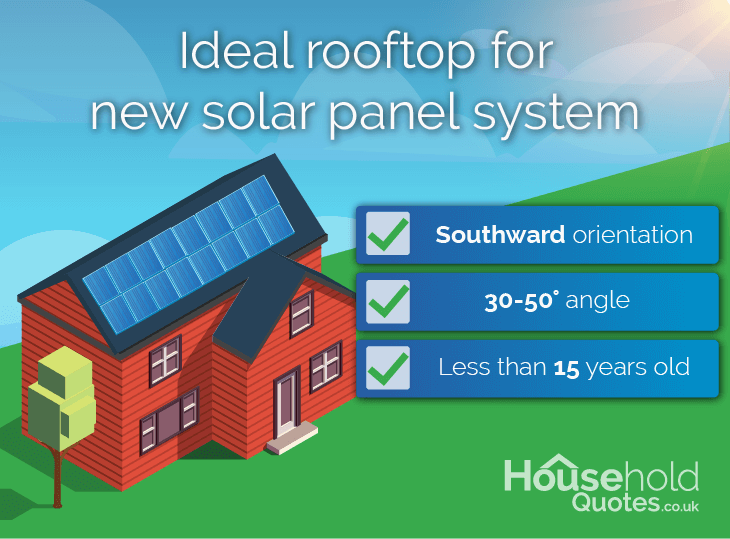Answer these simple questions and we will find you the BEST prices
Which type of solar quotes do you need?
It only takes 30 seconds
100% free with no obligation

Get up to 4 quotes by filling in only 1 quick form

Compare quotes and find yourself the best deal

Increase the value of your home by installing solar panels
- Householdquotes.co.uk
- Solar Panels
- Solar Panel Systems
Solar Panel Systems In The UK (2025)


- A solar panel system is a group of solar panels that generate electricity from solar energy, made up of an array of panels, an inverter, a metre, and an optional solar battery.
- The average-sized household in the UK typically uses a 3-4kW solar panel system. The correct solar panel system size will depend on your electricity consumption habits and the environmental conditions around your home.
- A 4kW solar panel system in the UK will likely cost between £5,000 - £6,000, not including on-the-day installation costs.
A solar panel system, also known as a solar array, is the name given to a group of solar panels connected to an inverter, a metre, and mounting equipment.
But first, do you know how you can save on a new solar panel installation? The best way is to compare solar quotes from various installation companies and choose the one that offers the most favourable deal. To do this, however, you could find yourself spending many hours researching the best installers to work with.
With Household Quotes, we can take all this work off your hands, by providing you with up to 4 quotes directly, from the best installers in your area. All you have to do is fill in our 30-second quotes form, then you'll be contacted by some top-rated, local companies.
Get started today by clicking the link below.
- Quotes from local installers
- Payment by finance available
- Save up to £915 per year
It only takes 30 seconds

How does a solar power system work?
A solar panel system is made up of multiple panels that are connected by wires. The sun shines directly onto the surface of the panels and together, the panels convert the energy into DC electricity.
An inverter then converts this DC (direct current) electricity into working AC (alternating current) electricity for your home. The more panels installed as part of your solar-powered system, the more electricity you'll be able to generate.
You can make full use of the electricity your system produces, and reduce reliance on the national grid, by installing an additional solar battery. If you are interested in adding one to your system, be sure to choose the best solar battery for your specific energy needs.
Solar panel systems in the UK come in various “sizes”, which refers to the amount of power your panels collectively produce. This varies depending on the size of the system, which will typically go up to 12 kilowatts (kW), at least for domestic installations in the UK.
The necessary solar panel system size for your home can be determined according to your typical electricity consumption. This is usually displayed on your electricity bills, as well as the environmental conditions in your area. How many solar panels you need in the UK will mostly depend on the solar panel wattage.
The table below shows the necessary solar panel system size required, according to the solar panel wattage. We've provided estimates for solar panel systems made up of 350W or 450W panels.
| What size solar system do I need? | ||||||
|---|---|---|---|---|---|---|
| House size | Solar system size | Estimated annual solar system electricity output | Number of 350W panels needed | Number of 450W panels needed | Required roof space (2m2 panels) | Estimated cost |
| Small; 1-2 bedrooms | 2kW | 1,700kWh | 5 | 4 | 8-10m2 | £2,500 - £3,500 |
| 3kW | 2,550kWh | 8 | 6 | 12-16m2 | £4,500 - £5,500 | |
| Medium; 3-4 bedrooms | 4kW | 3,400kWh | 10 | 8 | 16-20m2 | £5,000 - £6,000 |
| 5kW | 4,250kWh | 13 | 10 | 20-26m2 | £7,500 - £8,500 | |
| Large; 5-6 bedrooms | 6kW | 5,100kWh | 16 | 13 | 26-32m2 | £9,500 - £10,500 |
| 10kW | 8,500kWh | 28 | 21 | 42-56 m2 | £10,000 - £11,000 | |
| 12kW | 10,200kWh | 32 | 26 | 52-64m2 | £12,000 - £13,000 | |
These figures are based on estimates and the system size that you need should be based on your exact electricity consumption, the direction and tilt of your roof, and however many sunlight hours you get per day at your location. For an accurate estimation, you should consult a solar installer who can make a professional assessment.
2kW Solar system
A 2kW solar system will suit small homes or flats with 1-2 bedrooms. Take a closer look below.
| 2kW Solar system | ||||||
|---|---|---|---|---|---|---|
| House size | Solar system size | Estimated annual solar system electricity output | Number of 350W panels needed | Number of 450W panels needed | Required roof space (2m2 panels) | Estimated cost |
| Small; 1-2 bedrooms | 2kW | 1,700kWh | 5 | 4 | 8-12m2 | £2,500 - £3,500 |
The total cost of a 2kW system will come to £2,500 - £3,500, including on-the-day installation costs. Costs vary depending on the type of panels you install and their wattage.
A 2kW system can produce approximately 1,700kWh of electricity per year or 4.65kWh per day. We can use this figure to determine the number of solar panels your 2kW system will need, which we estimate to be 5x350W panels or 4x450W panels.
You may need to choose the more efficient solar panels if you’re tight on roof space, as they will take up less space. Installing 4-5 solar panels will require 8-10m2 of roof space. In terms of dimensions, the standard size of solar panels in the UK is 190cm x 100cm x 4cm (height x width x thickness).
A 3kW solar system is suitable for small-medium homes with 1-2 bedrooms. Here's a closer look:
| 3kW Solar system | ||||||
|---|---|---|---|---|---|---|
| House size | Solar system size | Estimated annual solar system electricity output | Number of 350W panels needed | Number of 450W panels needed | Required roof space (2m2 panels) | Estimated cost |
| Small; 1-2 bedrooms | 3kW | 2,550kWh | 8 | 6 | 12-16m2 | £4,500 - £5,500 |
A 3kW system will likely cost from £4,500 - £5,500, including installation. Keep in mind that costs vary based on panel type and wattage.
A typical 3kW system is expected to generate around 2,550kWh of electricity annually, or 6.9kWh per day. To achieve this, you'll need approximately 8x350W panels or 6x450W panels.
For installation, plan for a roof space of 12-16m², based on standard size of 190cm x 100cm x 4cm.
4kW Solar system
Living in a medium-sized home with 3-4 bedrooms? A 4kW solar system might be just what you need. Check out the specifications below:
| 4kW Solar system | ||||||
|---|---|---|---|---|---|---|
| House size | Solar system size | Estimated annual solar system electricity output | Number of 350W panels needed | Number of 450W panels needed | Required roof space (2m2 panels) | Estimated cost |
| Medium; 3-4 bedrooms | 4kW | 3,400kWh | 10 | 8 | 16-20m2 | £5,000 - £6,000 |
A 4kW solar panel system will typically cost between £5,000 - £6,000, depending on the output and efficiency of the system. These estimates do not include installation.
This 4kW system is designed to generate approximately 3,400kWh of electricity per year. That's a daily output of 9.3kWh. To achieve this, you can install around 10x350W panels or 8x450W panels.
Based on solar panels with 350W - 450W, allocate a roof space of 16-20m² for the installation of 8-10 standard-sized solar panels.
5kW Solar system
If you have a medium to large home with 4-5 bedrooms, a 5kW solar panel system could be the solution for you. Here are some details to consider:
| 5kW Solar system | ||||||
|---|---|---|---|---|---|---|
| House size | Solar system size | Estimated annual solar system electricity output | Number of 350W panels needed | Number of 450W panels needed | Required roof space (2m2 panels) | Estimated cost |
| Medium; 3-4 bedrooms | 5kW | 4,250kWh | 13 | 10 | 20-26m2 | £7,500 - £8,500 |
A 5kW panel system will likely cost between £7,500 - £8,500, including installation.
This 5kW system is expected to generate approximately 4,250kWh of electricity annually. To achieve this, you'll need around 13x350W panels or 10x450W panels.
You should allow a roof space of 20-26m² for the installation of 10-13 standard-sized solar panels.
6kW Solar system
For those in larger homes with 5-6 bedrooms, a 6kW solar system is a suitable option. Take a closer look below:
| 6kW Solar system | ||||||
|---|---|---|---|---|---|---|
| House size | Solar system size | Estimated annual solar system electricity output | Number of 350W panels needed | Number of 450W panels needed | Required roof space (2m2 panels) | Estimated cost |
| Large; 5-6 bedrooms | 5,100kWh | 5,100kWh | 16 | 13 | 42-56 m2 | £9,500 - £10,500 |
A 6kW panel system costs approximately £9,500 - £10,500, including installation. Remember, this can vary depending on the type of panels you install, with monocrystalline panels costing more than polycrystalline or thin-film panels.
This 6kW system is designed to generate approximately 5,100kWh of electricity per year. To achieve this, you'll need around 16x350W panels or 13x450W panels.
You should allocate a roof space of 42-56m2 for the installation of 10-13 standard-sized solar panels.
10kW Solar system
For larger homes or those with increased energy needs, a 10kW solar system is a suitable choice. Here's the breakdown:
| 10kW Solar system | ||||||
|---|---|---|---|---|---|---|
| House size | Solar system size | Estimated annual solar system electricity output | Number of 350W panels needed | Number of 450W panels needed | Required roof space (2m2 panels) | Estimated cost |
| Large; 5-6 bedrooms | 10kW | 8,500kWh | 28 | 21 | 8-12m2 | £10,000 - £11,000 |
The estimated cost for a 10kW system falls within the range of £10,000 - £11,000, including on-the-day installation costs. Be mindful that costs can vary based on panel type and wattage.
This 10kW system is expected to generate approximately 8,500kWh of electricity annually. To achieve this, you'll need around 28x350W panels or 21x450W panels.
You can expect a 10kW to require a considerable amount of roof space, approximately between 42-56m² for the installation of 21-28 standard-sized solar panels.
12kW Solar system
For larger homes with 6 or more bedrooms, or those with increased energy needs, a 12kW solar system is a safe choice. Here's the breakdown:
| 12kW Solar system | ||||||
|---|---|---|---|---|---|---|
| House size | Solar system size | Estimated annual solar system electricity output | Number of 350W panels needed | Number of 450W panels needed | Required roof space (2m2 panels) | Estimated cost |
| Large; 6+ bedrooms | 12kW | 10,200kWh | 32 | 26 | 8-12m2 | £12,000 - £13,000 |
Investing in a 12kW system will typically cost from £12,000 - £13,000, including installation costs on the day. Panel type and wattage contribute to variations in costs.
This 12kW system is designed to generate approximately 10,200kWh of electricity per year. To achieve this, you'll need around 32x350W panels or 26x450W panels.
Allocate a roof space of 52-64m² for the installation of 26-32 standard-sized solar panels.
While our estimates can give you a good idea of the correct system size for your home, we always recommend that you seek the advice of a professional installer who can assess your home's unique specifications.
With Household Quotes, the process of finding the right installer is easy! Rather than spending countless hours searching for installers and requesting quotes, let us connect you with up to 4 of the best installers in your area. You can then compare their free, tailored quotes and choose the one you'd like to work with.
Get started by filling in our 30-second quotes form.
- Quotes from local installers
- Payment by finance available
- Save up to £915 per year
It only takes 30 seconds

Can everyone install a solar powered system for their home?
Anyone in the UK can install solar panels, or roof integrated solar panels, but several factors come into play that might influence the number of panels needed, their performance and efficiency, and the type of solar panels required.
Before we explore some of these external factors, it’s important to first know the types of solar panels available in the UK, since you may require one over the other based on your home’s requirements.
In the UK, solar panels typically convert 10-22% of solar energy into electricity. Higher percentage ratings mean more electricity generation. The table below outlines average efficiency ratings per type of solar panel:
| Solar panel efficiency | |
|---|---|
| Type of solar panel | Efficiency |
| Monocrystalline | 15 – 22% |
| Polycrystalline | 15 – 20% |
| Thin-film | 10 – 20% |
The most efficient solar panels you can install are monocrystalline panels, which are easily recognised by their all-black appearance. Most solar manufacturers provide monocrystalline panels as their main products because they have numerous benefits.
If your home is not optimal for efficient solar power generation, then monocrystalline panels are likely to be the best option as their high levels of efficiency can help make up for these conditions. The only downside is that they will cost more than polycrystalline and thin-film panels.
Polycrystalline solar panels are slightly less efficient, due to a more complex silicon structure. Therefore, they may be less suitable for homes that are trying to capture as much solar energy as possible, have limited roof space or those living in sub-optimal conditions.
Despite lower efficiency (as low as 10%), thin-film panels excel in low-light conditions and tolerate high temperatures well, making them versatile for various settings. However, homes with less than ideal conditions for solar power generation probably shouldn’t install these panels if they want their solar panel system to run as efficiently as possible.
In the end it is advisable to get several quotes from local installers and look at the total cost per installed power (measured in Watts). In some cases, although the less efficient modules cost less, they may need more racking and labour so the final total cost will be higher. Other times, the reverse is true.
Now, let’s take a look at some of the external conditions that can affect how your solar-powered system runs.

Sunlight hours
Solar panel output varies according to available sunlight hours, which peak during summer. The UK experienced a daily average of 4.9 sunlight hours in 2022, according to Statista.
Sunlight hours will vary depending on your location in the UK, with the South of England experiencing the most sunlight throughout the year and the northern parts of Scotland experiencing the least. As such, limited sunlight regions may require additional panels.
Rooftop size and strength
You should also consider the dimensions and weight of your solar panels. As mentioned above standard solar panel dimensions in the UK are typically 190cm x 100cm x 4cm (height x width x thickness), and weigh 18-21kg. Most UK rooftops can easily support this weight.
If you have limited roof space, you can consider installing fewer solar panels with a higher wattage. At the same time, to ensure that you can make the most of your system’s power output, you will need to choose highly efficient solar panels.
Rooftop direction and orientation
Optimal solar panel efficiency depends on the right direction and orientation. As the UK is in the Northern Hemisphere, the ideal angle is 30-50° towards the equator with a southward orientation. Any deviation from this direction will result in lower efficiency. However, east or west-facing roofs will work effectively across the solar array’s lifetime.
If your roof doesn’t offer the best solar panel orientation, consider a ground-mounted array or flat roof installation. These allow you to adjust the angle to meet the sun’s rays directly.
Is a solar panel system the right choice for my household?
Installing a solar system for your home is certainly worth it considering the environmental benefits of using clean, renewable energy, as well as giving you the opportunity to become energy independent. What's more, the average household can make annual electricity bill savings of up to £660.
Government schemes, like the Smart Export Guarantee, even allow you to earn an income the more energy your solar panel system is able to produce by selling any excess energy back to the national grid.
While the benefits of going solar are clear, the process of finding the right installer and all the time and effort associated with solar panel installation might be enough to put you off. To make this easier, use Household Quotes' free quotes comparison service.
Rather than spending hours of searching for the best installers in your area, simply fill in our 30-second form and let our team connect you with up to 4 of the best installers in your area. With multiple quotes to compare, you can be sure that you'll land a good installation deal.
All of our quotes are free and you're under no obligation to accept the quotes you receive. Simply click the button below to get started.
- Quotes from local installers
- Payment by finance available
- Save up to £915 per year
It only takes 30 seconds

Frequently asked questions
The best solar panel system in the UK depends on your average electricity consumption and how well-suited your home is to solar power generation. The average-sized home in the UK is best suited to a 3-4kW solar panel system.
The average-sized home will require a 3-4kW solar panel system made up of 8-10 350W solar panels or 6-8 450W solar panels.
A 4kW system is the most ideal solar panel system for the average 3-bedroom household in the UK. This will produce approximately 3,400kWh of electricity per year and require between 8-10 panels.

Ciaran is a content writer at Household Quotes. He has become an expert in energy saving and eco-conscious living which he uses to create informative content for Household Quotes readers.

